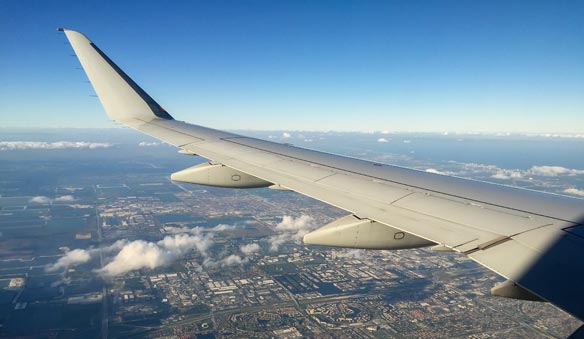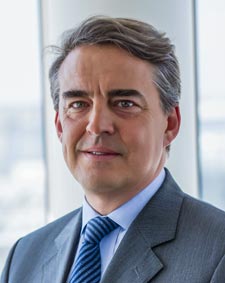
Governments must step up in fight against carbon emissions

MIKE DUNBAR
Governments must abide by their climate change commitments if the global aviation industry is to achieve its long-term carbon emission goals.
That was the clear message delivered by IATA director general Alexandre de Juniac at the recent CAPA Centre for Aviation aeropolitical and regulatory summit.

de Juniac
But he added, “In absolute terms, however, aviation’s emissions were growing, so we committed to cap net emissions with carbon neutral growth from 2020. For a carbon intensive industry with no alternative power source that was a major step to take in 2009.”
The former Air France-KLM chief exec explained, “Early on, we recognized that achieving this would require the industry to work together with common goals, and one of those goals was to get governments to implement a single global economic measure to help us get there.”
And he pointed out, “For sure, the industry would continue to improve technology, operations and infrastructure. We knew that these alone would not be sufficient, and we also knew that our capabilities would be compromised, if a patchwork of environmental regulation, taxes and charges emerged.”
“We were successful,” de Juniac declared. “The Carbon Offsetting and Reduction Scheme for International Aviation (CORSIA) was a landmark agreement by governments enabling such an important result for our planet at the International Civil Aviation Organization (ICAO) assembly in 2016.”
But he warned, “Governments must now keep to their commitment. Too many are inventing taxes in the name of the environment. These siphon money that we could invest in sustainability projects, and they undermine the effectiveness of CORSIA and the political consensus on which it was built.”
IATA’s top exec told summit delegates, “Looking beyond carbon neutral growth, we have an even tougher 2050 goal: To reduce net emissions to half 2005 levels irrespective of growth.”
And he urged, “Here, too, global standards have a role to play. Sustainable aviation fuels are the biggest hope. To scale these up to commercial levels, governments must set a regulatory and legal framework that stimulates the sustainable aviation fuel industry – the same way that governments incentivized the development of the wind and solar power sectors.”
De Juniac pointed out that, in the past, the aviation industry has suffered from well-intentioned regulatory efforts that have not produced the desired results, citing the US tarmac delay rule as the classic example.
He explained, “US regulators wanted to eliminate excessive tarmac delays to improve the travel experience even in difficult situations like extreme weather events, and they set the fines so high that long tarmac delays have virtually disappeared.
“Good result. Not really. Airlines are incentivized to preemptively cancel flights rather than risk a long delay, and a cancelled flight is never a good outcome for a traveller.”
Coronavirus outbreak addressed
During his CAPA summit presentation, IATA’s director general also addressed the novel coronavirus outbreak and its implications for the airline industry, which flew through the 2003 SARS and the 2009 H1N1 swine flu epidemics which, combined, are estimated to have claimed some half a million lives.
He told delegates, “It should come as no surprise – and give great reassurance – that we have a global framework to help contain outbreaks. These are the International Health Regulations (IHR) built under the leadership of the World Health Organization (WHO).
“The global mobility that aviation creates is a factor in virus spread, so we work closely with the WHO with the objective of being able to operationalize what public health authorities need us to do,” explained de Juniac.
And he pointed out, “We have also defined industry standards to keep our passengers and crews safe. This includes guidance for crew, front line, cleaning and maintenance staff among others. These are endorsed by the WHO and, in some cases, included in the IHR.
According to the DG, the effectiveness of the standards is assisted by several factors. He pointed out, “Supplied air on modern aircraft is as safe as that of an operating theatre thanks to advanced filtering systems. Communicating good hygiene practices to passengers helps, and there are various screening measures – thermal and manual – at strategic airports to keep potentially infected passengers off airplanes.”
And he explained, “The WHO’s declaration that we are in a ‘public health emergency of international concern’ is part of the IHR plan and did not mean that people’s individual safety had taken a turn for the worse, but indicated that the scale of the situation requires governments to cooperate to contain and hopefully eliminate the virus.”
